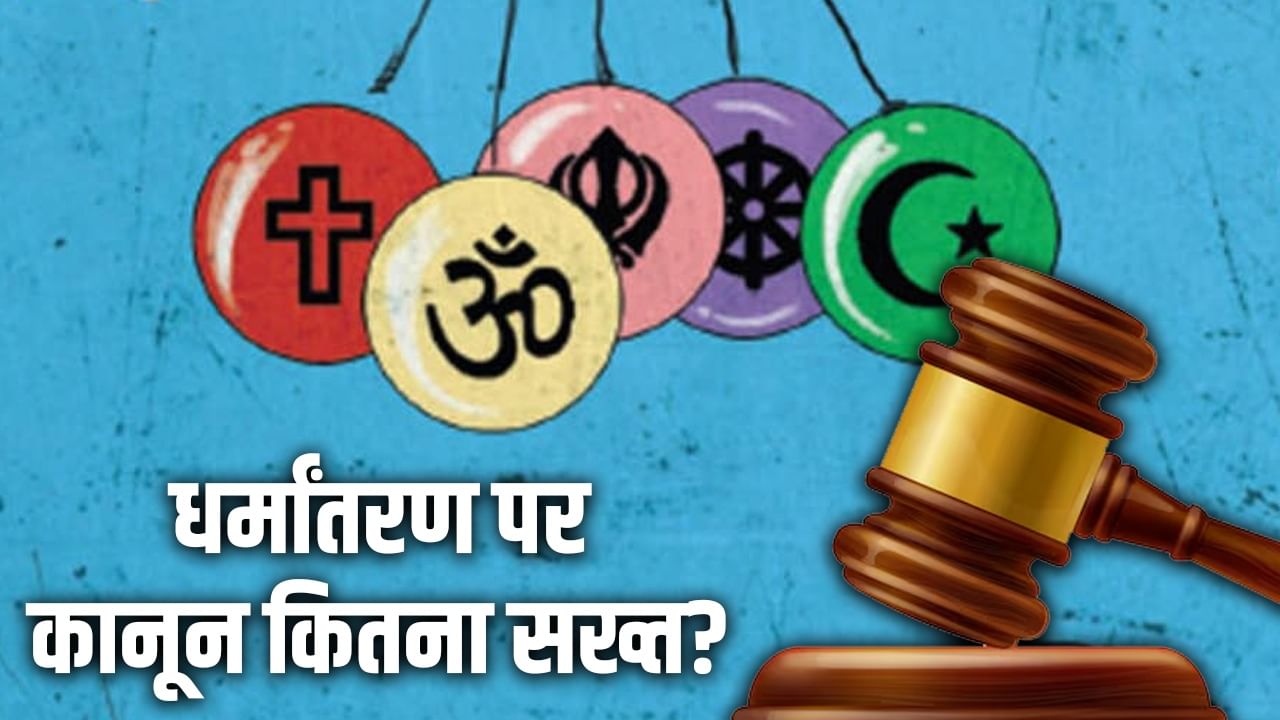Religious conversion punishment in india: The Indian Constitution has given every citizen a fundamental right to freedom of religion. From Article 25 to 28, citizens have the right to obey any religion, propagate it and behave according to their belief. But there has been a debate about conversion in India for a long time. It is often alleged that under some circumstances, conversion, temptation or deception are converted.
In this background, many states have enacted anti-conversion laws from time to time. Recently, the Rajasthan government has also prepared to bring a similar law, in which a proposal is being told to keep life imprisonment and a fine of up to Rs 50 lakh.
Let us understand in detail on the pretext of the proposed law of Rajasthan, what are the provisions of anti-conversion laws in which states, and what is the provision of punishment and fine.
Rajasthan: Life imprisonment, 50 lakh fine
The Rajasthan government has announced that it is going to bring one of the most tight conversion laws in the country. According to the proposed draft, if a person changes religion by forcefully, deception or temptation, then he can be sentenced to life imprisonment. Apart from this, a fine of up to Rs 50 lakh can also be imposed. Violation of the law will be considered a serious offense and will be a non -bailable offense. There will be a provision of more strict punishment for conversion of minors, women and people of Scheduled Castes/Tribes. This proposal is launching a debate at the national level as it will be the most rigorous provision ever.
Uttar Pradesh: 5 years in jail, fine of 15 thousand rupees
In the year 2021, Uttar Pradesh implemented its law. The main provisions under this are as follows. For force or deception, there will be a fine of 1 to 5 years and a fine of Rs 15,000. If a minor, woman or a person of Scheduled Caste/Tribe is a victim of conversion, then the punishment will be 3 to 10 years and a fine will be 25 thousand rupees. There is a provision of a fine of minimum 3 years and maximum of 10 years, along with a fine of at least 50 thousand rupees for collective conversion. Before conversion, the person has to inform the district magistrate.
Madhya Pradesh: 5 years in jail, 25 thousand fine
Madhya Pradesh has also passed a new law in this regard. Under this, the conversion will be imprisoned for 1 to 5 years and a fine of 25 thousand rupees. In the case of women, minor and scheduled castes/tribes, a sentence of 2 to 10 years and a fine of Rs 50,000 will be imposed. Group conversion is sure to imprison 5 to 10 years of imprisonment and a fine of Rs 1 lakh. Marriage for conversion is also declared illegal.
Gujarat: 10 years imprisonment, 50 thousand fine
The Gujarat government has made a provision to imprison up to 3 to 10 years of imprisonment in its law and fined 25 thousand to 50,000 rupees. In the case of women, minors and scheduled castes/tribes, it will be punished and fine. A fine of up to Rs 2 lakh can be imposed in case of collective conversion. Forced conversion has been declared a crime through marriage.

Uttarakhand: 5 years imprisonment, 25 thousand rupees fine
This Himalayan state has made arrangements to imprison 1 to 5 years of imprisonment and 25 thousand rupees on forced conversion. A woman, a minor or a person associated with the weaker section will be imprisoned for 2 to 7 years and a fine of 50 thousand rupees. There is a provision of strict punishment for cheating by hiding religious identity through marriage.
Himachal Pradesh: Sentenced to 5 years, fine of 25 thousand rupees
In Himachal Pradesh, there is a provision to impose a sentence of 1 to 5 years and a fine of 25 thousand rupees for forceful conversion. In women, minor or scheduled caste/tribe cases, there will be imprisonment of 2 to 7 years and a fine of Rs 1 lakh. It is mandatory to inform the District Magistrate before conversion here.

Jharkhand: 3 years imprisonment, fine of 50 thousand
In Jharkhand, there is a system of imprisoning 3 years imprisonment and a fine of 50 thousand rupees on forced conversion. The provisions for women, minor and scheduled castes/tribes are more rigid. In this, imprisonment of 4 years and a fine of up to Rs 1 lakh can be imposed.
Odisha: 1 year jail, fine of 5 thousand
Odisha is the first state in India to implement the Religion Freedom Act. Under this, 1 year jail and a fine of five thousand rupees can be imposed on force conversion. There can be 2 years imprisonment and a fine of Rs 10,000 for conversion of women, minor or scheduled castes/tribes.
2 years imprisonment in Arunachal Pradesh and 5 years imprisonment in Haryana
In Arunachal Pradesh, forcibly conversion can be imprisoned for 2 years and a fine of Rs 10,000. Under the Haryana Conversion Prohibition Act, 2022, there is a imprisonment of 1 to 5 years and a fine of Rs 1 lakh on deception or force conversion. There is a provision of imprisonment of 2 to 10 years and a fine of up to Rs 3 lakh on conversion of women, minor and scheduled castes/tribes.

Karnataka: 10 years sentence
Karnataka has also passed a tough law in 2022, which has a provision of punishment of up to 10 years. Apart from this, many other states are also taking steps towards making laws or revising from time to time.
Anti-conversion laws in India have been enacted by different states according to their social and cultural scenario. This law is applicable in some form or the other in almost all states. Voluntary conversion is allowed but conversion through conditions like force, deception, temptation or marriage is a crime.
In normal condition, there is a provision for imprisonment ranging from 1 year to 10 years and a fine ranging from five thousand rupees to 3 lakh rupees. This issue is not only legal but also socio-political. On the one hand it is seen as a control over personal freedom, on the other hand supporters consider it a medium to prevent deception and forced conversion in the society. In the coming days, the law of Rajasthan will deepen this debate.
Also read: What kind of Mughal emperor Akbar’s ‘cabinet’, how was Navratna elected?
